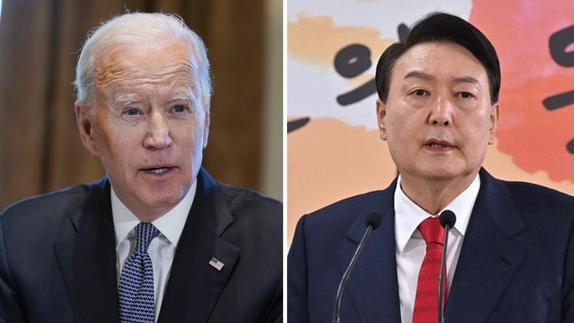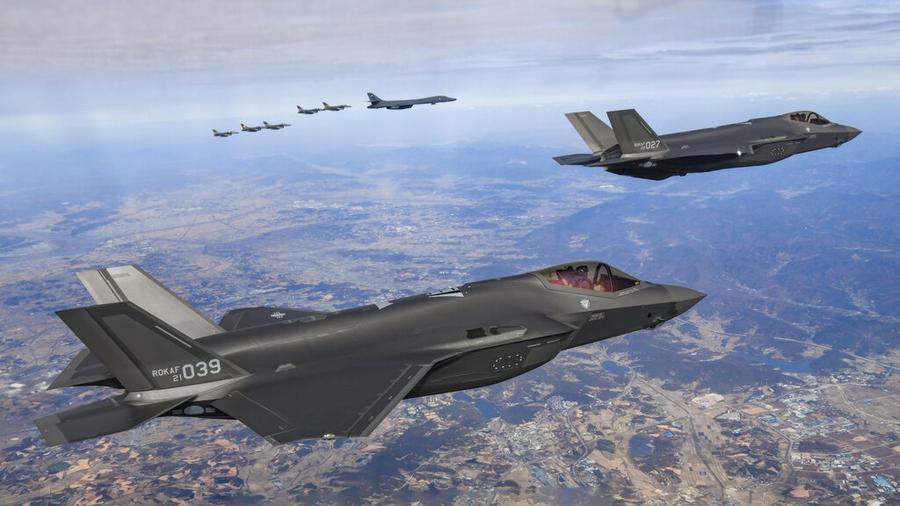 US President Joe Biden (left) speaks during a meeting with military leaders in the Cabinet Room the White House in Washington April 20, 2022, while South Korean President Yoon Suk-yeol speaks during a press conference at the National Assembly Library in Seoul, on March 10, 2022. (PHOTOS / AP & XINHUA)
US President Joe Biden (left) speaks during a meeting with military leaders in the Cabinet Room the White House in Washington April 20, 2022, while South Korean President Yoon Suk-yeol speaks during a press conference at the National Assembly Library in Seoul, on March 10, 2022. (PHOTOS / AP & XINHUA)
SEOUL/WASHINGTON - South Korea and the United States are discussing joint planning and implementation of US nuclear operations and hope to conduct a tabletop exercise soon, officials from both sides said on Tuesday.
The plan came amid South Korean President Yoon Suk-yeol's push to strengthen American extended deterrence - the US military capability, especially its nuclear forces, to deter attacks on its allies - since taking office in May.
In a newspaper interview released on Monday, Yoon said the allies are discussing joint nuclear planning and exercises and that would help clear doubts about the extended deterrence, with its existing concept "falling short of convincing" South Koreans.
In a newspaper interview released on Monday, South Korean President Yoon Suk-yeol said the allies are discussing joint nuclear planning and exercises and that would help clear doubts about the extended deterrence, with its existing concept "falling short of convincing" South Koreans
"The two countries are discussing ways to share information on the operation of US-owned nuclear assets, and joint planning and execution of them accordingly," Yoon's press secretary, Kim Eun-hye, said in a statement.
A senior US administration official said both sides are looking at enhanced information sharing, joint contingency planning and an eventual tabletop exercise following a request from their presidents after a meeting in Cambodia in November.
But the official noted regular nuclear exercises would be "extremely difficult" because South Korea is not a nuclear power, echoing the comment from US President Joe Biden that the allies were not discussing such activities.
ALSO READ: S. Korea, US agree to implement liquidity measures if needed
"This is going to be done through a variety of ways, including as President Yoon said, through enhanced information sharing, joint planning and expanding the range of contingencies that we plan for, as well as training, and with the idea eventually leading up to a tabletop exercise," the official told Reuters.
The timing of the planned tabletop exercises has not been finalized, but they would take place "in the not-too-distant future" and cover scenarios including nuclear situations, the official said.
A National Security Council spokesperson said in a statement that the United States is committed to providing extended deterrence, and that the allies are working on "an effective coordinated response to a range of scenarios."
 In this photo provided by South Korean Defense Ministry, a US Air Force B-1B bomber (sixth from top left) South Korean Air Force F-35 fighter jets and US Air Force F-16 fighter jets (left) fly over South Korea Peninsula during a joint air drill in South Korea on Nov 19, 2022. (SOUTH KOREAN DEFENSE MINISTRY VIA AP)
In this photo provided by South Korean Defense Ministry, a US Air Force B-1B bomber (sixth from top left) South Korean Air Force F-35 fighter jets and US Air Force F-16 fighter jets (left) fly over South Korea Peninsula during a joint air drill in South Korea on Nov 19, 2022. (SOUTH KOREAN DEFENSE MINISTRY VIA AP)
But a senior US official noted regular nuclear exercises would be "extremely difficult" because South Korea is not a nuclear power, echoing the comment from US President Joe Biden that the allies were not discussing such activities
When asked about the tabletop exercises, a spokesman for South Korea's defense ministry said talks were under way but declined to provide details.
The two countries have revived consultations on extended deterrence this year after a years-long hiatus.
Kim Dong-yup, a professor at Kyungnam University, said the comment from Biden, who has sole authority to authorize the use of US nuclear weapons, suggests an American reluctance to share nuclear operations, given their sensitivity and security concerns.
READ MORE: ROK, US to launch preliminary drills ahead of major exercise
"Given growing voices for tactical nuclear weapons, Washington could try to give reassurances and send more nuclear assets when we want, but they're unlikely to fully materialize President Yoon's push for greater extended deterrence," Kim said.


